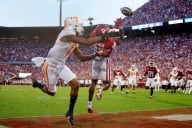You have /5 articles left.
Sign up for a free account or log in.
The concurrent hits to the head that the University of Arizona's quarterback, Matt Scott, took as he slid to the turf in Saturday's game against the University of Southern California are just the sort that cause concussions. And when Scott, during the timeout that followed as officials assessed a penalty against the USC defenders, threw up on the field, the game announcers drew what seemed an obvious conclusion.
"Any neurologist will tell you that [that is] one of the symptoms and signs of a concussion," Joe Tessitore told viewers. "Get him out of the game," said his partner, Matt Millen. But when the game continued, Scott was still at the helm of the Arizona offense, which he led to a game-clinching touchdown several plays later. (Video of the play and the broadcasters' comments can be found here.)
What seemed like a decision to put the team's success ahead of a star player's health led to widespread castigation for Arizona Coach Rich Rodriguez and the university, with a columnist for Forbes blasting the university -- and by extension, the National Collegiate Athletic Association -- for paying lip service to the idea that player safety is their foremost concern.
But Arizona officials insist that the critics got it wrong. In an interview with Inside Higher Ed on Monday, Arizona's athletics director, Greg Byrne, insisted that there was no evidence that Scott had suffered a concussion from the hits to the head. And as logical as it might have been for the announcers (and others) to attribute Scott's vomiting to head trauma, Byrne said, the player had in fact been complaining before the game of nausea, as he often does on game days.
In the timeout that followed the play on which Scott was injured, Arizona's head trainer observed the quarterback as he spoke to Rodriguez, and "there were no deficiencies identified through the observation" to suggest a concussion, Byrne said. (Byrne said that tape of the broadcast shows the trainer listening as the coach and player talk.) Scott returned to the field and after one play, Arizona called another timeout during which medical employees observed him again. And again, Byrne said, "there were no signs" to suggest a concussion.
After the touchdown, medical employees "continued to observe Matt," and as a "precaution," opted to withhold him from the rest of the game, Byrne said. Tests of Scott on Sunday and Monday offered no evidence of a concussion.
As for the vomiting that game announcers understandably viewed as signs that Scott had suffered a concussion, Byrne said: "We had knowledge of Matt being nauseous throughout the day." Byrne said that Scott frequently suffers from nausea when he exerts himself intensely.
NCAA and college officials have been under increasing pressure to respond forcefully to evidence of hits to the head amid growing evidence of the detrimental effects of head trauma. There is intense skepticism about whether teams take the threat seriously and do enough to protect players, and embedded in some of the criticism of Arizona for seeming to minimize Scott's injury was an argument that there would be no risk to the Wildcat football program for doing so. "Arizona Just Broke the NCAA's Concussion Policy. Will it Matter?" was the headline on the Forbes article.
An NCAA spokesman said he could not comment on the circumstances surrounding a particular player, but said that a university that violated the association's policy on "concussion management" could face penalties as would if it broke other rules.









